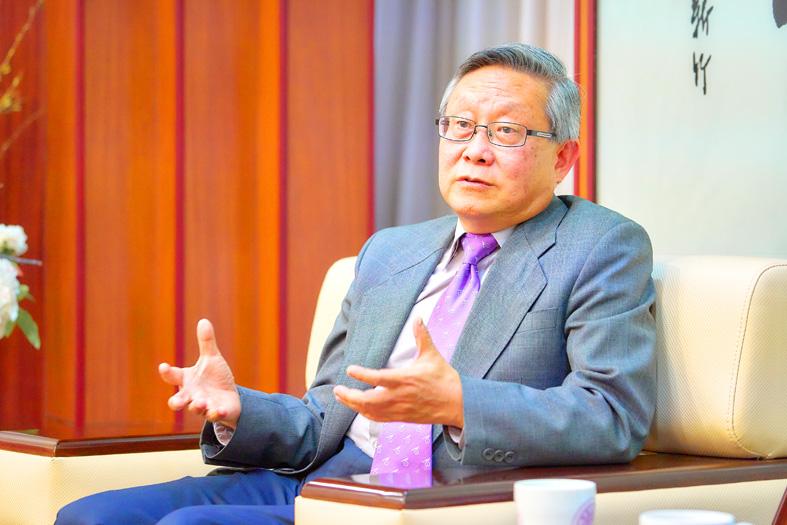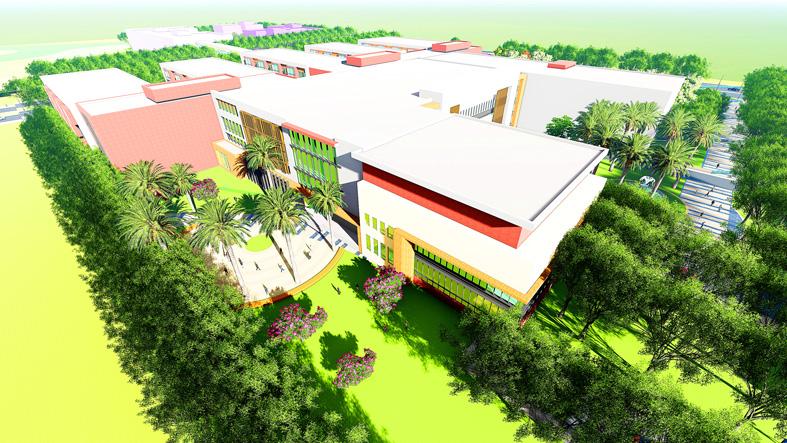National Tsing Hua University (NTHU) is heading into a new “era of medicine” and looking to bring Taiwan’s medical prowess to the world with a new medical department and hospital.
NTHU is to welcome its first class of medical students in August. A plan to build its own hospital was also approved by the Ministry of Health and Welfare’s Medical Review Committee on March 14.
The Ministry of Education in September last year approved NTHU’s proposal to establish a Department of Post-baccalaureate Medicine, which is now recruiting 23 government-financed students for the fall semester.

Photo: Hung Mei-hsiu, Taipei Times
NTHU president Hocheng Hong (賀陳弘) said in an interview with the Taipei Times on March 24 that the program aims to enroll and nurture doctors for the new era, who would be well-versed in technology or their own specialties other than medicine, are more determined than most high-school graduates to become doctors, and are passionate about serving remote communities.
The students will learn and receive internship training at Tsing Hua hospital, and another one or two well-established hospitals. The new Tsing Hua hospital is to be constructed under a build-operate-transfer (BOT) contract and is expected to commence operations in 2027, he said.
NTHU will invite bids from private hospitals next month and will negotiate with potential partners on the most ideal cooperation model before sending the operational plan to the health ministry for review, he added.

Photo courtesy of National Tsing Hua University
“The hospital that works with us can take advantage of NTHU’s outstanding teaching and research abilities to expand its conglomerate. For example, it can collaborate with NTHU’s professors in various departments,” he said.
The hospital is to be located in the Taoyuan Aerotropolis, providing the much-needed medical resources around Taoyuan’s Lujhu (蘆竹), Dayuan (大園), Guanyin (觀音) and Sinwu (新屋) districts, he added.
At the core of NTHU’s “era of medicine” is the vision to combine medicine with state-of-the-art technologies in the “ABC” field — artificial intelligence, big data and cloud storage — a trend widely seen around the world, Hocheng said.
He added that he believed that “in the future, medicine will not be medicine without ABC.”
Hocheng said he hoped to bring NTHU’s strengths in material science, mechanics, chemistry, nuclear medicine and brain science, together with developments in ABC, to create a cross-disciplinary, smart hospital.
“There is plenty of room at the bottom,” Hocheng said, quoting US Nobel laureate in physics Richard Feynman to elaborate on his vision for the hospital.
The president interpreted the bottom from two angles — from the grassroots and southbound.
The hospital would be a decentralized hub that connects the experiences of all doctors and assists grassroots doctors, whose lack of experience in the beginning can be compensated for with the help of ABC technologies, he said.
“Grassroots healthcare will no longer be lonely,” because doctors can refer to past cases stored in the cloud when there are no other experienced doctors around to help, Hocheng said, adding that these doctors can be connected to the world and feel supported.
In comparison to huge medical centers already equipped with more human and material resources, the benefits grassroots healthcare institutions can get from advanced technologies are more prominent, he added.
As there is a lack of channel for exporting Taiwan’s excellent medical capabilities, the hospital could be a starting point to bring Taiwan’s advanced medical technologies to the global stage, beginning with Southeast Asia, he said.
The convenient location of the hospital, only 400m from the Airport MRT’s A16 Hengshan (橫山) Station and two stops from Taiwan Taoyuan International Airport and the Taoyuan high-speed rail station, means that it is readily accessible for international patients seeking medical care in Taiwan, Hocheng said.
NTHU has already helped treat more than 200 cancer patients from Australia, Brazil, Japan, Singapore, Spain and other countries with its world-leading Boron Neutron Capture Therapy, which was developed using Taiwan’s only reactor for research use, he said.
Tsing Hua hospital will seek more opportunities to collaborate with cities in Southeast Asia to provide better treatment for patients without necessarily flying them to Taiwan, which is the most common practice in Taiwan’s hospitals at present, he said.
The hospital plans to set up remote medical bases in places like Jakarta, New Delhi, Mumbai and Yangon, offering advice to local medical institutions remotely from Taiwan, he added.
The choice of locations is to be finalized depending on the needs, population and technical abilities, among other factors, of the target cities, he said.
Hocheng said he also hoped to establish links with Europe and the US, saying the US’ west coast, where there is a sizeable Chinese-speaking population, would be a good candidate.
Developing international medicine can also reduce the hospital’s financial reliance on the National Health Insurance and out-of-pocket spending from patients, he said.
The hospital hopes to generate 10 percent of its revenue from international medicine, which should translate into more autonomy and freedom in its operation, he said.
It could help improve its technology and provide services to patients who might not be able to afford expensive treatments, he added.

A strong continental cold air mass is to bring pollutants to Taiwan from tomorrow, the Ministry of Environment said today, as it issued an “orange” air quality alert for most of the country. All of Taiwan except for Hualien and Taitung counties is to be under an “orange” air quality alert tomorrow, indicating air quality that is unhealthy for sensitive groups. In China, areas from Shandong to Shanghai have been enveloped in haze since Saturday, the ministry said in a news release. Yesterday, hourly concentrations of PM2.5 in these areas ranged from 65 to 160 micrograms per cubic meter (mg/m³), and pollutants were

Taiwan’s armed forces have established response protocols for a wide range of sudden contingencies, including the “Wan Chun Plan” to protect the head of state, the Ministry of Defense (MND) said today. After US President Donald Trump on Saturday launched a series of airstrikes in Venezuela and kidnapped Venezuelan President Nicolas Maduro, concerns have been raised as to whether China would launch a similar “decapitation strike” on Taiwan. The armed forces regularly coordinate with relevant agencies and practice drills to ensure preparedness for a wide range of scenarios, Vice Minister of National Defense Hsu Szu-chien (徐斯儉) told reporters before a

EVA Airways on Saturday said that it had suspended a pilot and opened an investigation after he allegedly lost his temper and punched the first officer several times as their plane was taxiing before takeoff at Los Angeles International Airport. According to a report published on Thursday by The Reporter, the incident occurred after the flight’s Malaysian first officer tried to warn the Taiwanese pilot, surnamed Wen (文), that he was taxiing faster than the speed limit of 30 knots (55.6kph). After alerting the pilot several times without response, the first officer manually applied the brakes in accordance with standard operating

Japanese Councilor Hei Seki (石平) on Wednesday said that he plans to visit Taiwan, saying that would “prove that Taiwan is an independent country and does not belong to China.” Seki, a member of the Japan Innovation Party, was born in Chengdu in China’s Sichuan Province and became a naturalized Japanese in 2007. He was elected to the House of Concilors last year. His views on the Chinese Communist Party (CCP) — espoused in a series of books on politics and history — prompted Beijing to sanction him, including barring Seki from traveling to China. Seki wrote on X that he intends